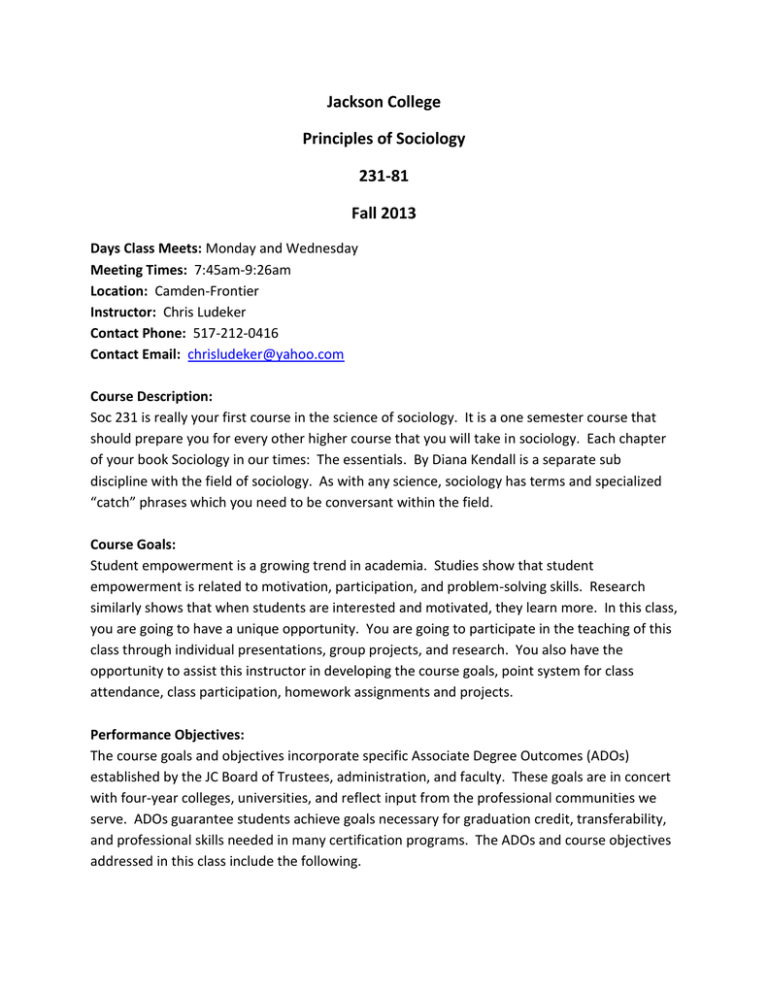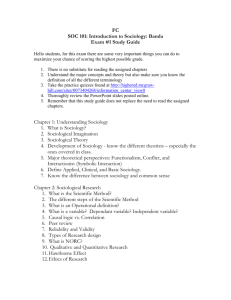soc.231.81 - Jackson College
advertisement

Jackson College Principles of Sociology 231-81 Fall 2013 Days Class Meets: Monday and Wednesday Meeting Times: 7:45am-9:26am Location: Camden-Frontier Instructor: Chris Ludeker Contact Phone: 517-212-0416 Contact Email: chrisludeker@yahoo.com Course Description: Soc 231 is really your first course in the science of sociology. It is a one semester course that should prepare you for every other higher course that you will take in sociology. Each chapter of your book Sociology in our times: The essentials. By Diana Kendall is a separate sub discipline with the field of sociology. As with any science, sociology has terms and specialized “catch” phrases which you need to be conversant within the field. Course Goals: Student empowerment is a growing trend in academia. Studies show that student empowerment is related to motivation, participation, and problem-solving skills. Research similarly shows that when students are interested and motivated, they learn more. In this class, you are going to have a unique opportunity. You are going to participate in the teaching of this class through individual presentations, group projects, and research. You also have the opportunity to assist this instructor in developing the course goals, point system for class attendance, class participation, homework assignments and projects. Performance Objectives: The course goals and objectives incorporate specific Associate Degree Outcomes (ADOs) established by the JC Board of Trustees, administration, and faculty. These goals are in concert with four-year colleges, universities, and reflect input from the professional communities we serve. ADOs guarantee students achieve goals necessary for graduation credit, transferability, and professional skills needed in many certification programs. The ADOs and course objectives addressed in this class include the following. A. Throughout this course and at the end of the course you should be able to examine problems and issues related to life and the behavior sciences in general and sociology in particular, using appropriate critical thinking techniques. To learn to initiate and sustain a discussion of meaning of specific behavior patterns. ADO 5, developing. B. You should be able to apply the scientific process and related techniques, as employed by science in general and social sciences in particular. Expand vocabulary, learn to minimize bias, looks and weighs evidence, poses questions and conclusions. ADO 7, developing. C. Understand individual and group differences, and show appreciation for the traditions and values of various groups in the United States. D. Understand how personal issues can become public issues through sociological imagination and understanding different perspectives. At some point near the end of the term you might get a series of assessment tests—showing how much (or how little) you have learned in this course. The board of trustees of JC requires this information. Textbook: Required textbook—Sociology in our Times. The Essentials. By Diana Kendall. Failure: This course follows the college publications regarding pass/fail. Academic Honesty Policy: Policy Summary: Academic dishonesty (e.g. cheating, plagiarism, etc.) is generally an instructional and teachable opportunity for faculty to guide students and for students to learn from their actions and/or behavior. However, in serious cases, the Academic Honesty Policy provides a process for reporting, tracking, and disciplining academic dishonesty. Definitions: Academic Honesty: Is defined as ethical behavior that includes student production of their own work and not representing others' work as their own, by cheating or by helping others to do so. Plagiarism: Is defined as the failure to give credit for the use of material from outside sources. Plagiarism includes but is not limited to: submitting other's work as your own documentation -plagiarism – is the reuse of significant, identical or nearly identical portions of one’s own work without acknowledging that one is doing so or without citing this original work Cheating: Is defined as obtaining answers/material from an outside source without Makeup Policy: No makeup work will be allowed. The only exception to this rule is if the student discusses their situation with this instructor and at that time it will be decided if makeup work will be allowed. Help: If you are struggling in this course and feel that you need extra help please see me as soon as possible and we will make arrangements. Students with disabilities who believe that they may need accommodations in this class are encouraged to contact the office of Learning Support Services at 517-787-0800, extension 8270/8553 as soon as possible to ensure that such accommodations are implemented in a timely fashion. Student Responsibilities: Attend class, complete assignments, and participate in class. We have the unique opportunity to learn with multiple students from different schools via the I-TV. At times this can be frustrating and difficult because it can be hard to hear others and sometimes the other schools have a tendency to feel left out. Please be considerate and respectful of others by allowing each individual to have their turn to speak, listen carefully, and respond to others when appropriate. Extras: It is strongly suggested that you do not text, play with cell phone, playing on computer or any other electronics during class session. Please be aware that even though I may not say anything to you if I see this happening it will affect your grade. I have had experiences in the past where students completed a very minimal amount of work throughout the class and at the last minute made attempts to “catch up.” This not only creates more work for me but also for you. I will not be sympathetic and understanding if you make the choice to do this. However, I do understand that life can be difficult sometimes and things are thrown at us with no warning. If you make attempts to speak with me and explain your situation so we can work something out I will do this for you. Again, I will not do this if you do not communicate with me. Grading Scale: 4.0 = 3.5 = 3.0 = 2.5 = 2.0 = 1.5 = 1.0 = 0.5 = 0.0 = 94-100 89-93 84-99 78-83 72-77 66-71 60-65 55-59 0-54 Calendar: Our class meets every Monday and Wednesday from 7:45am-9:26am. Class begins September 9, 2013 through December 11, 2013. We follow Camden-Frontier and Jackson College schedule. In the event that Camden has a fog or snow day we will not meet for class. September 9, 2013: Introductions, Syllabus, Expectations, course goals, assignments, grading scale. What is Sociology? Read Chapter 1-3. September 11, 2013: Guest Speaker September 16 & 18: Lecture, class discussions, in class assignments over chapters 1-3. September 23: NO CLASS! September 25: Quiz on Chapters 1-3. September 30 –October 28: Chapters 4-6 October 30: Mid-Term Paper and Presentation November 4-18: Quiz on Chapters 4-6. Read chapters 7 & 8 November 20: NO CLASS! November 25: Chapter 9 November 27: NO CLASS! December 2-December 9: Chapters 9-10 December 11: Final Exam! The above schedule is a very rough outline of what we will be doing on these dates. Revisions will be necessary during the course. The reason for this is due to working together the first day of class in developing a full schedule, assignments, exams, quizzes, etc. I am very excited and looking forward to meeting all of you and getting started on a great year!!







